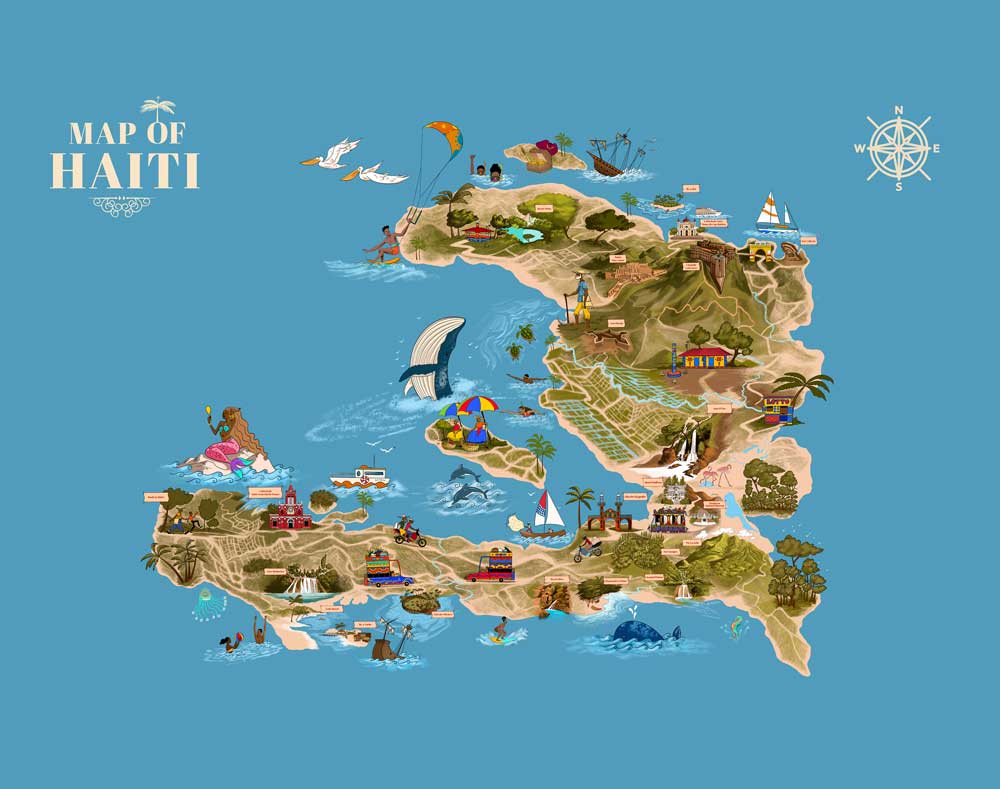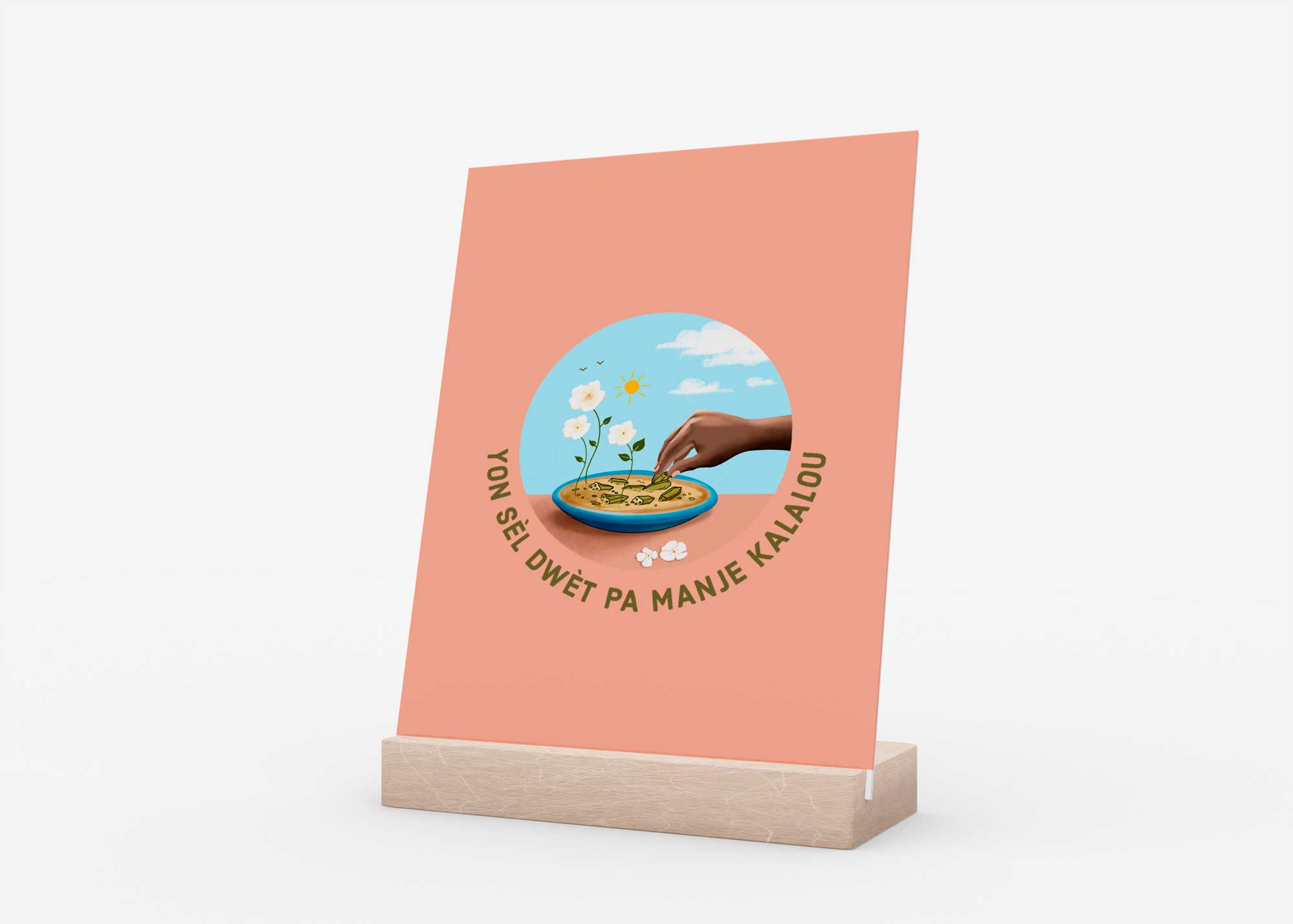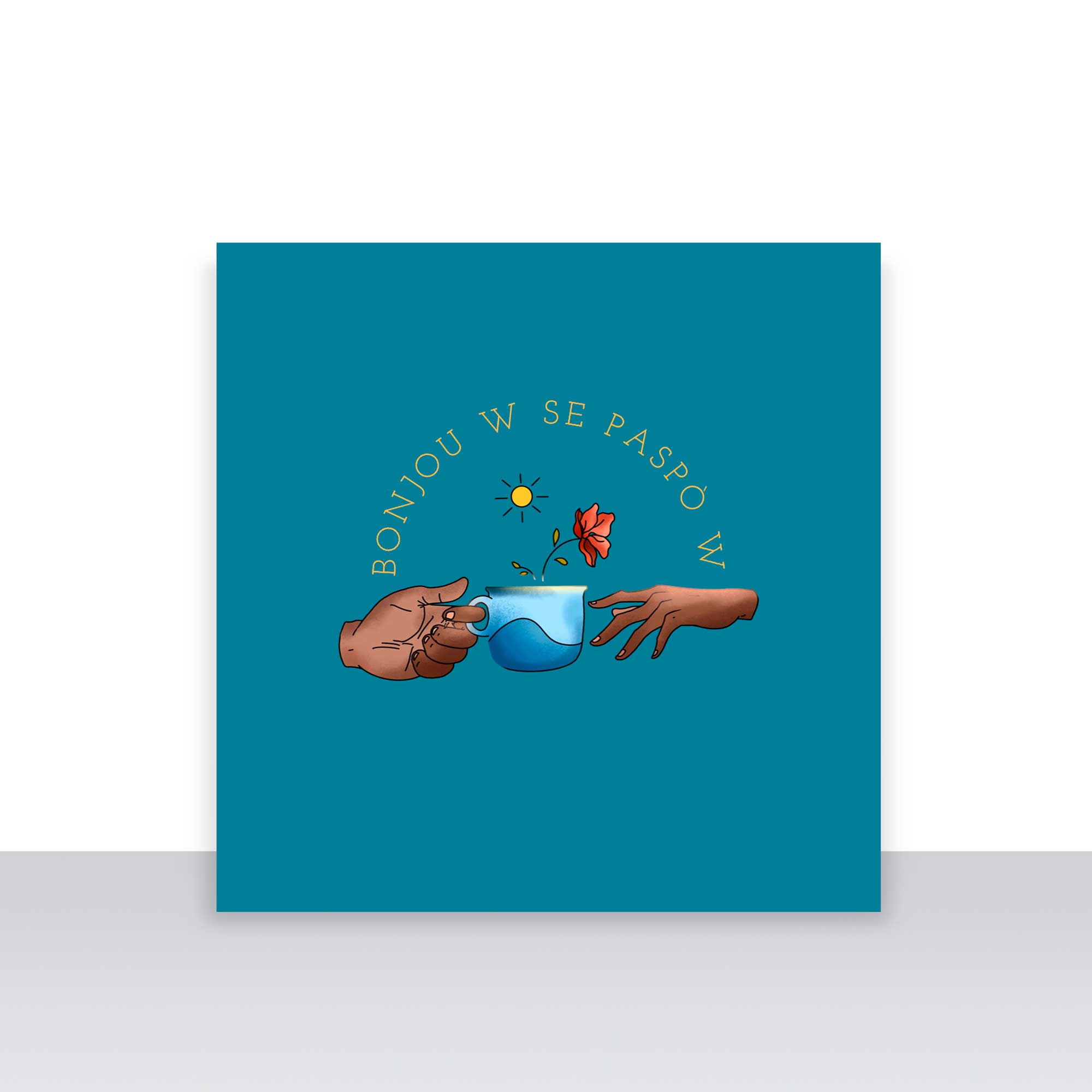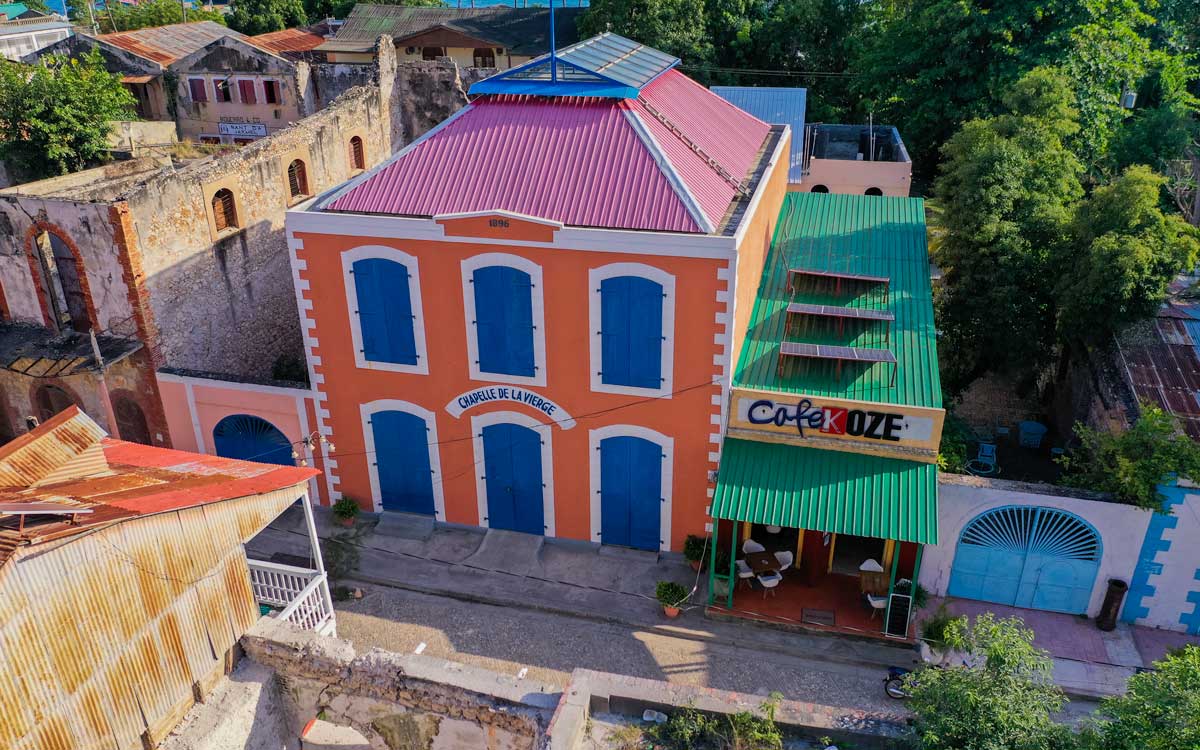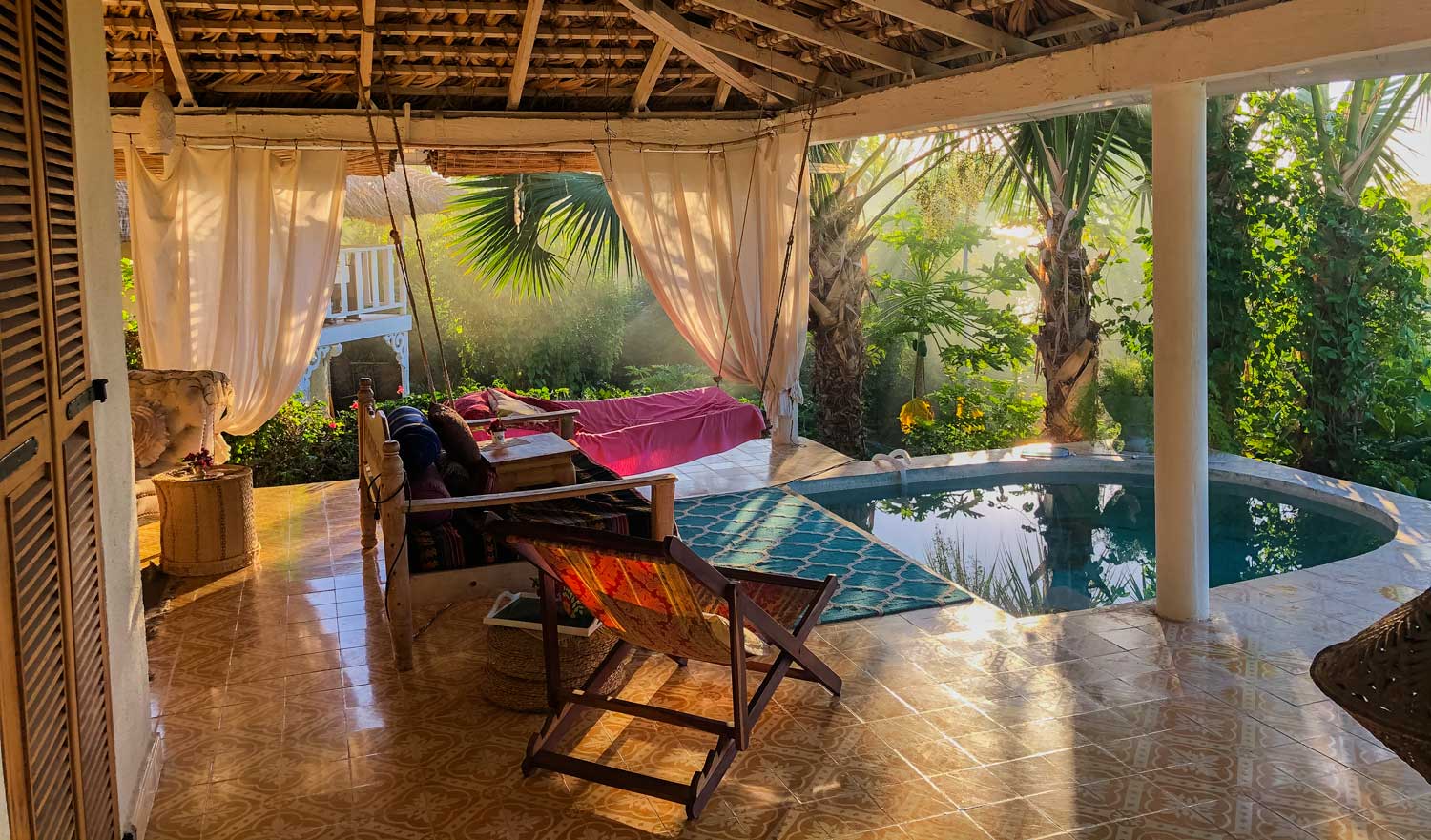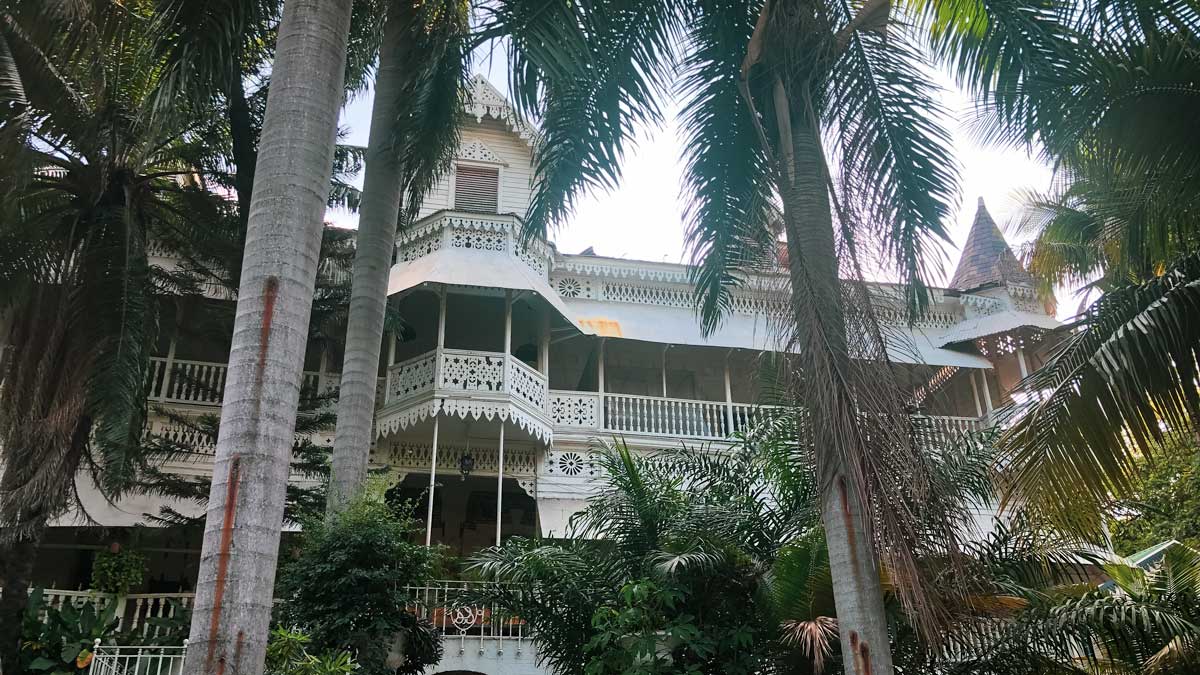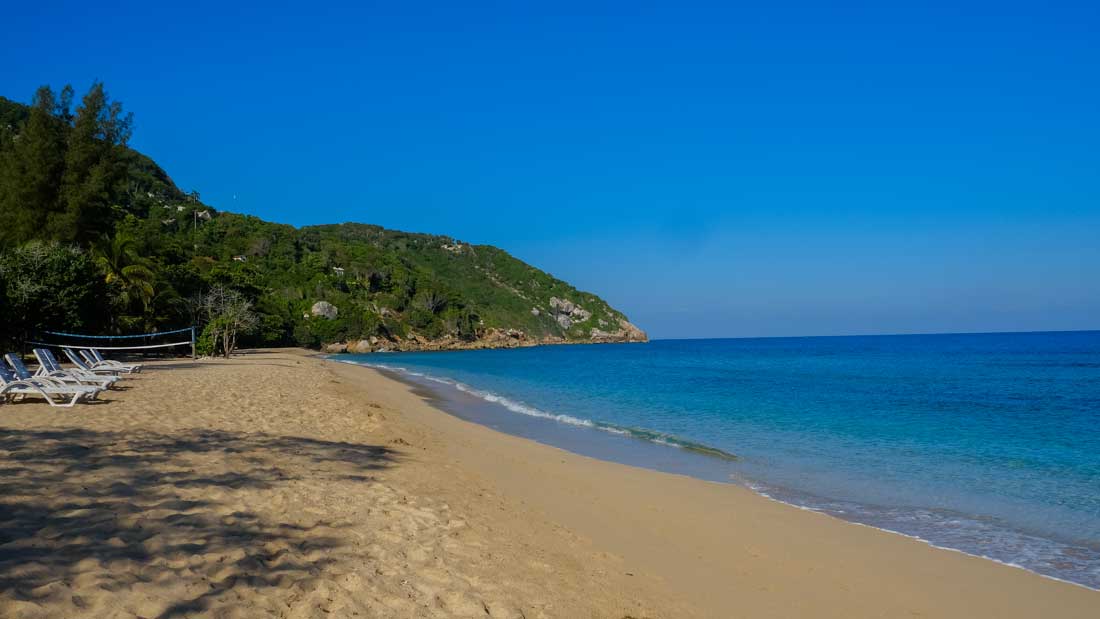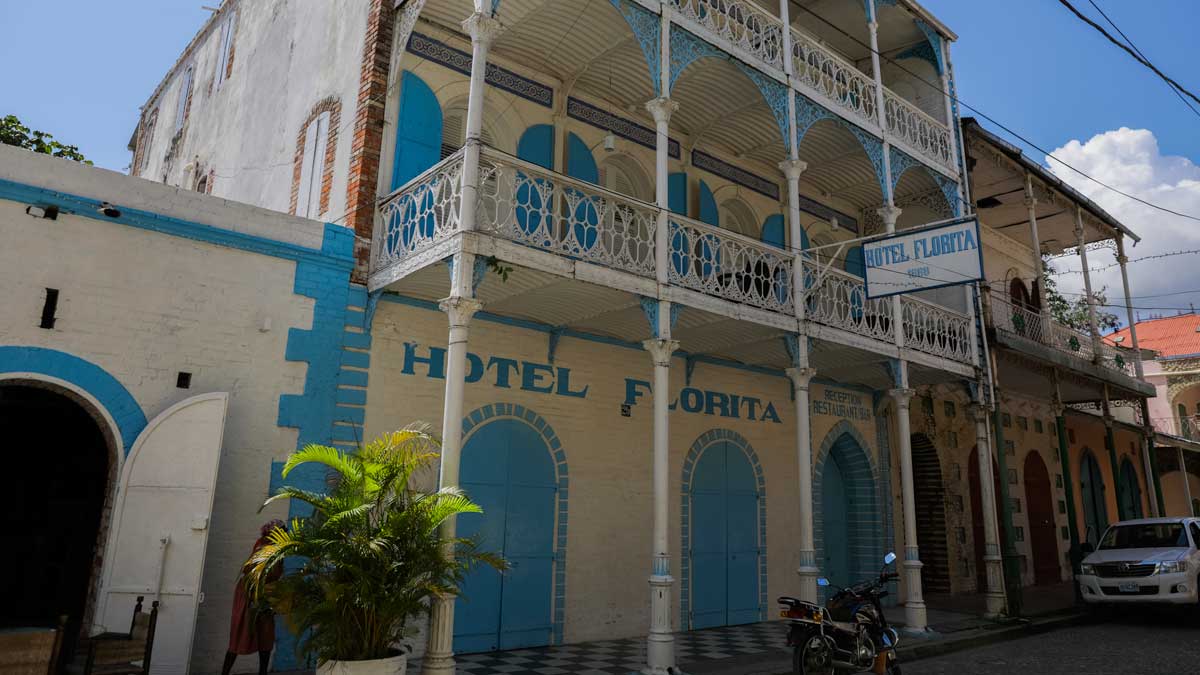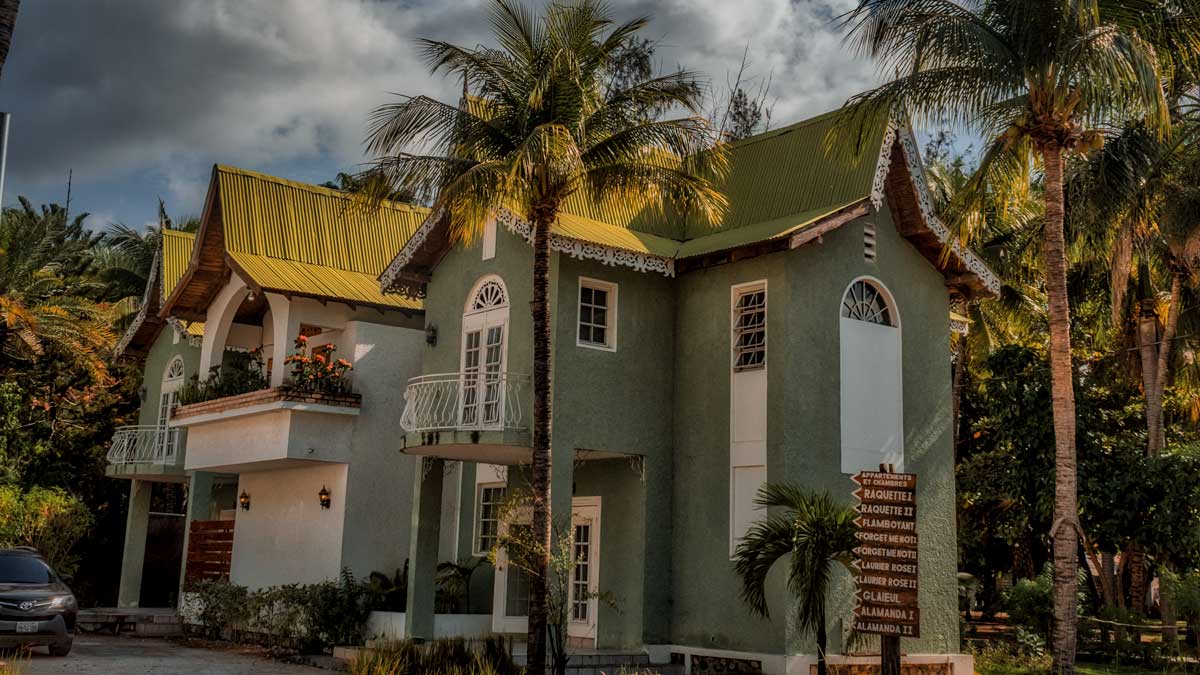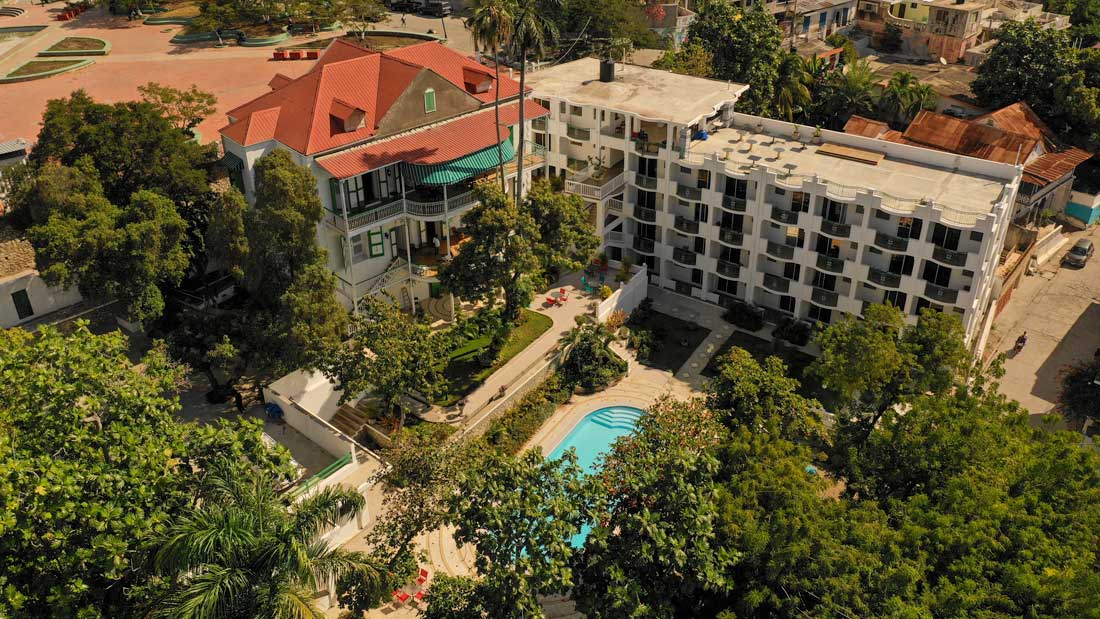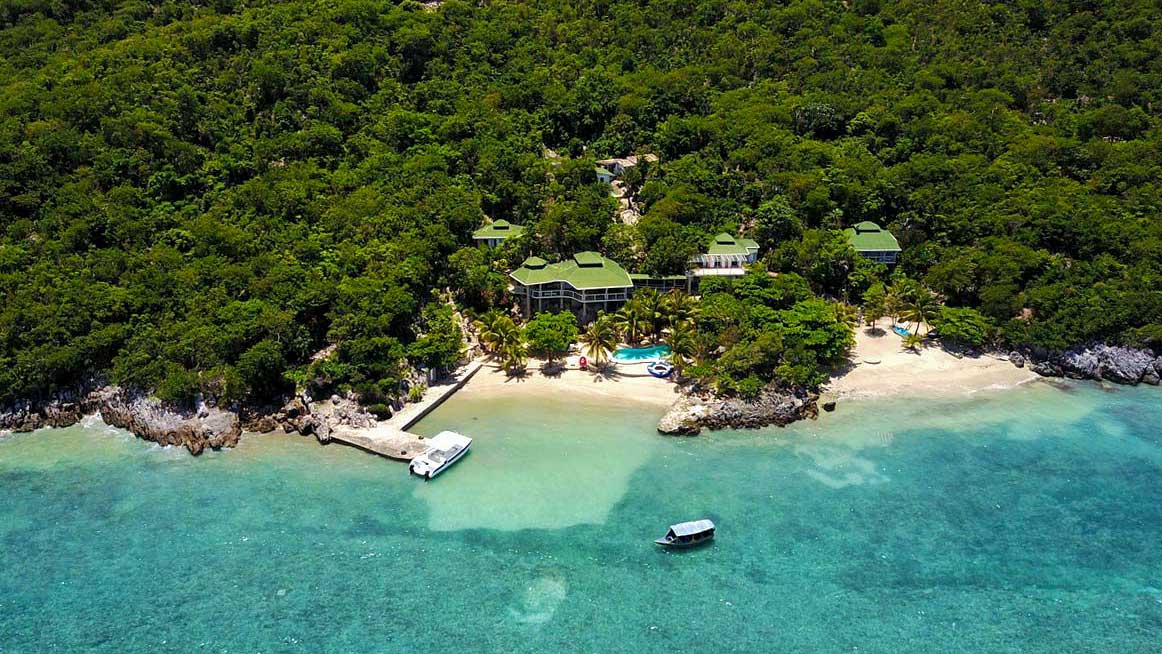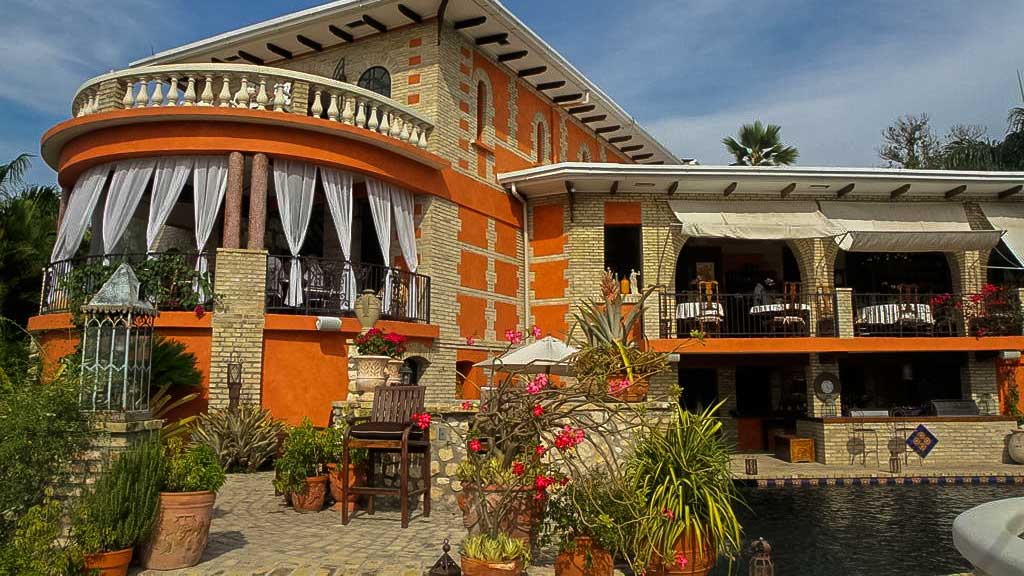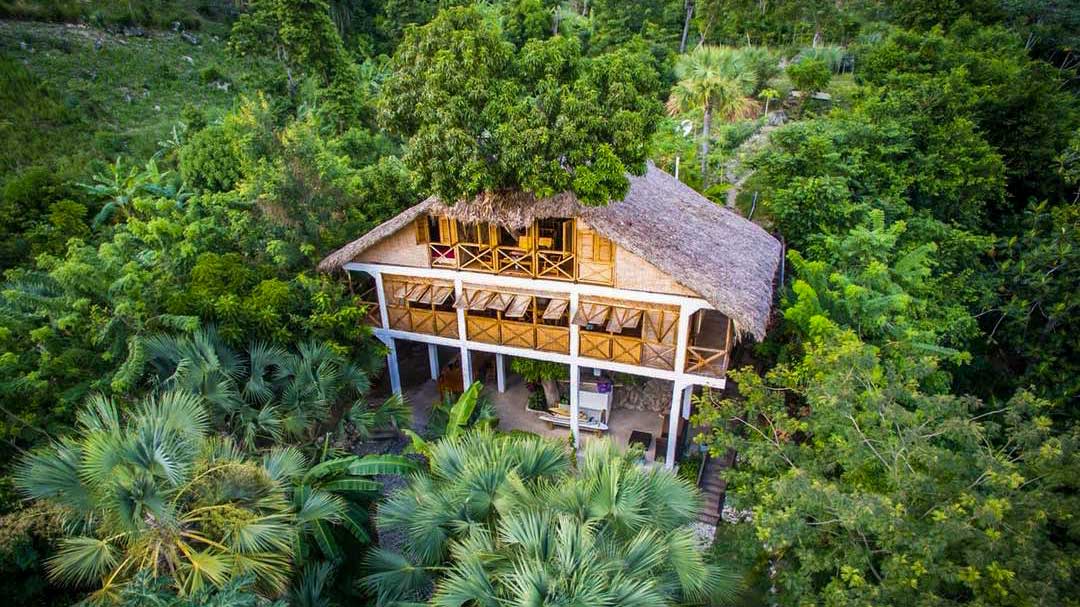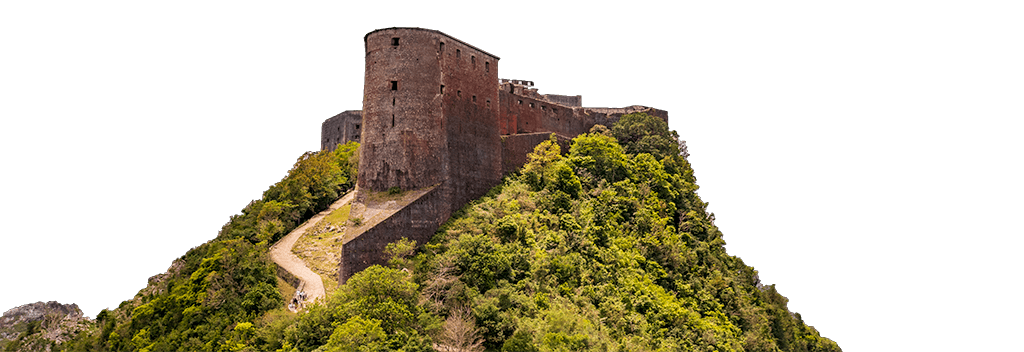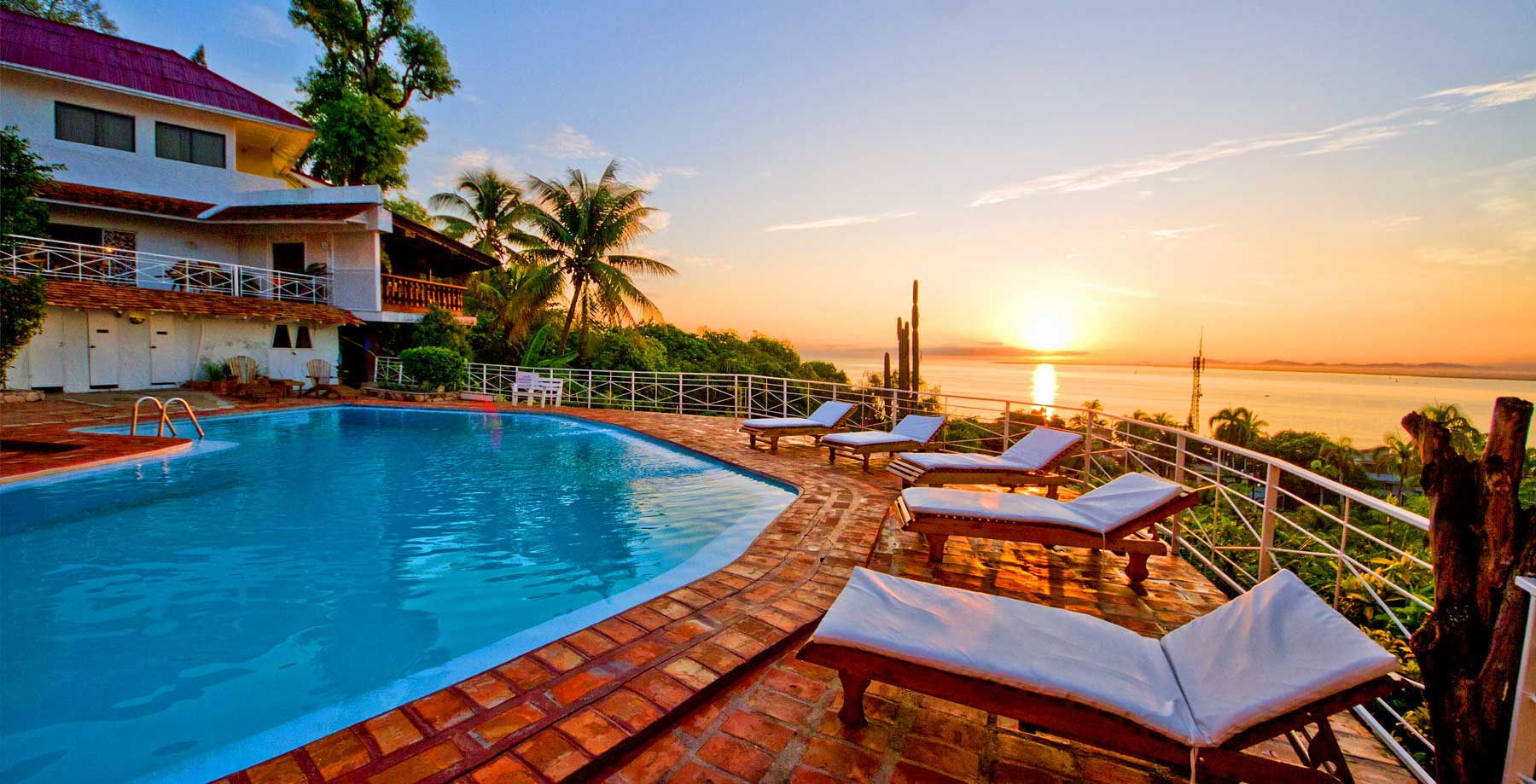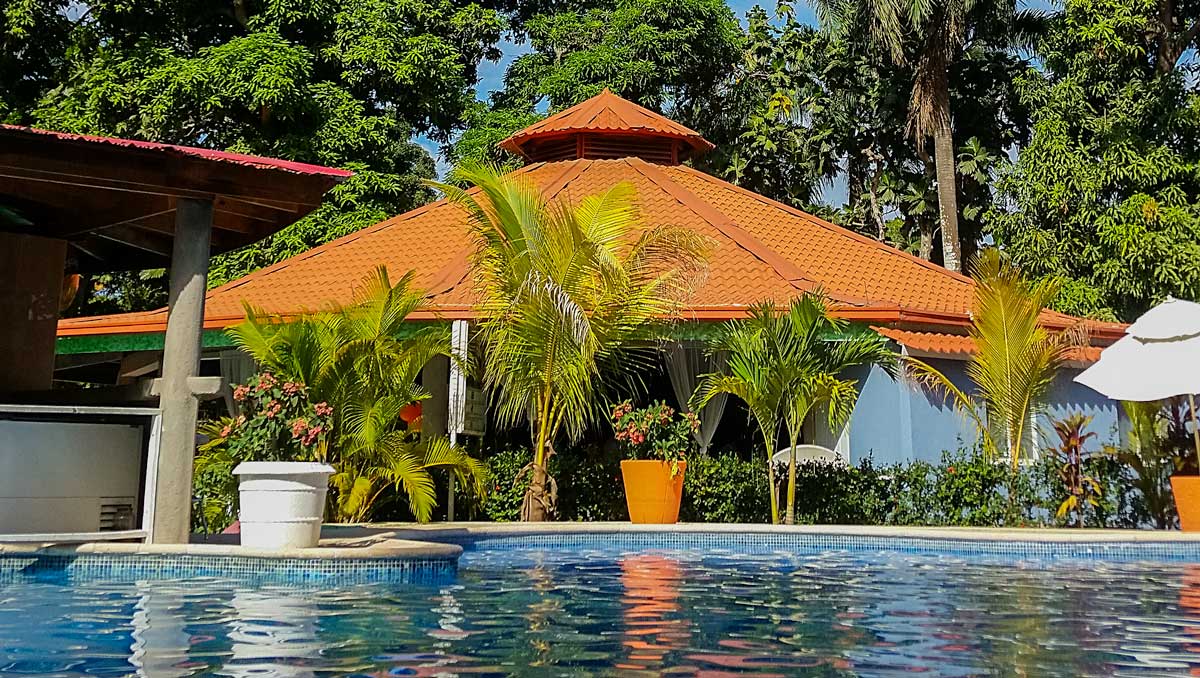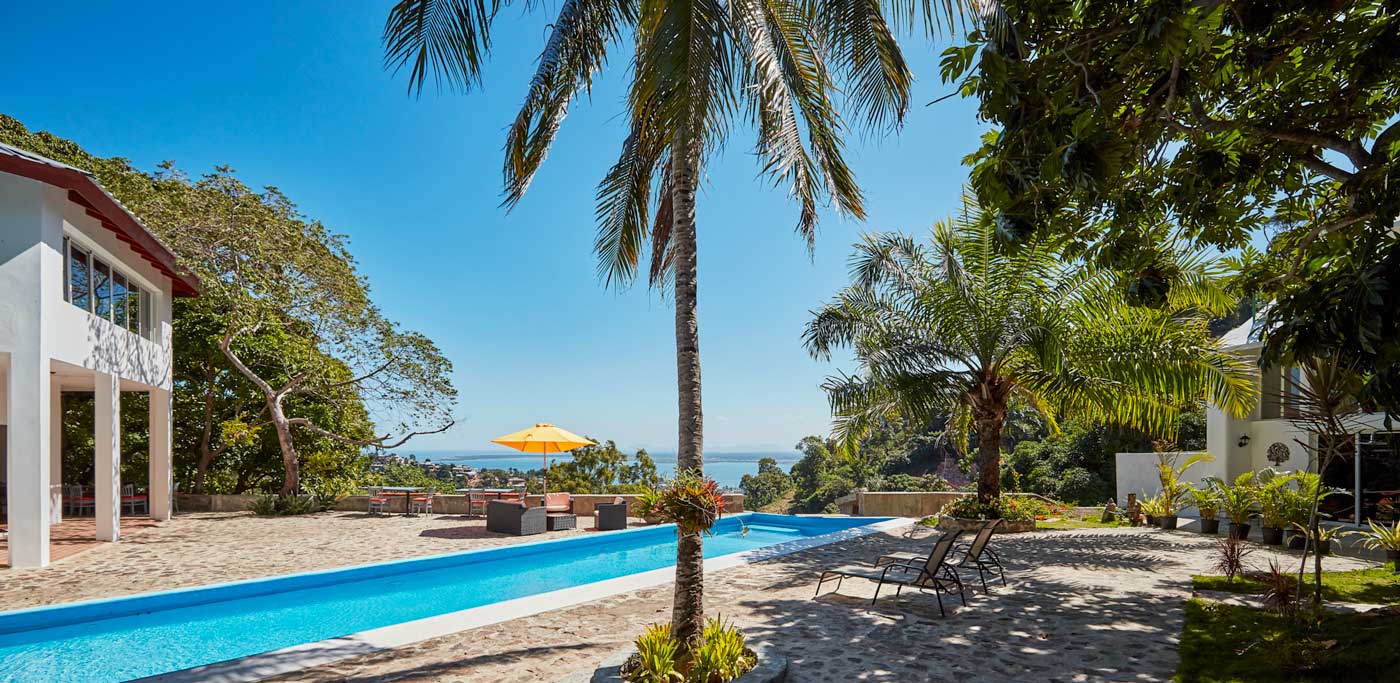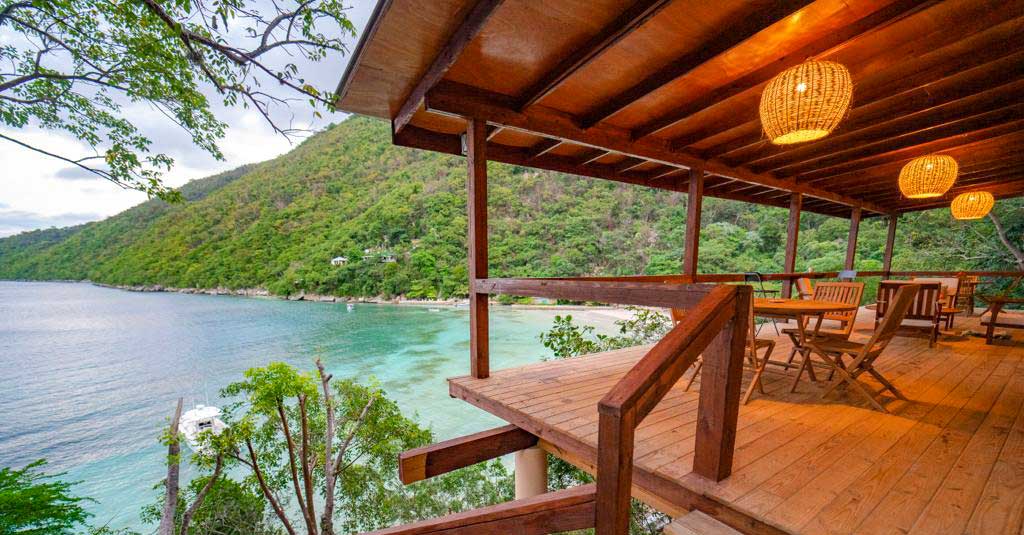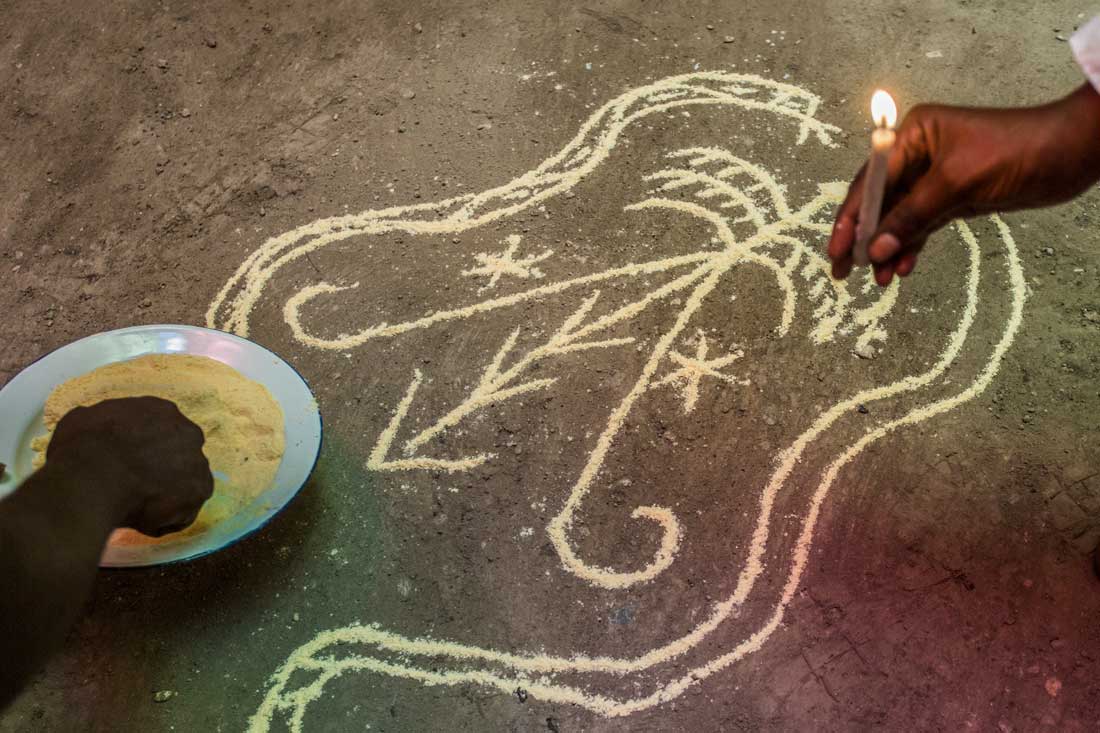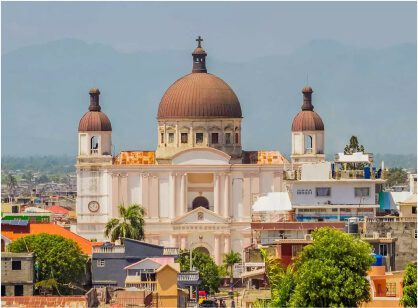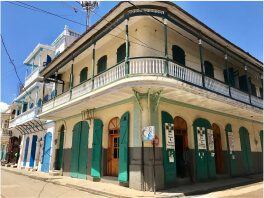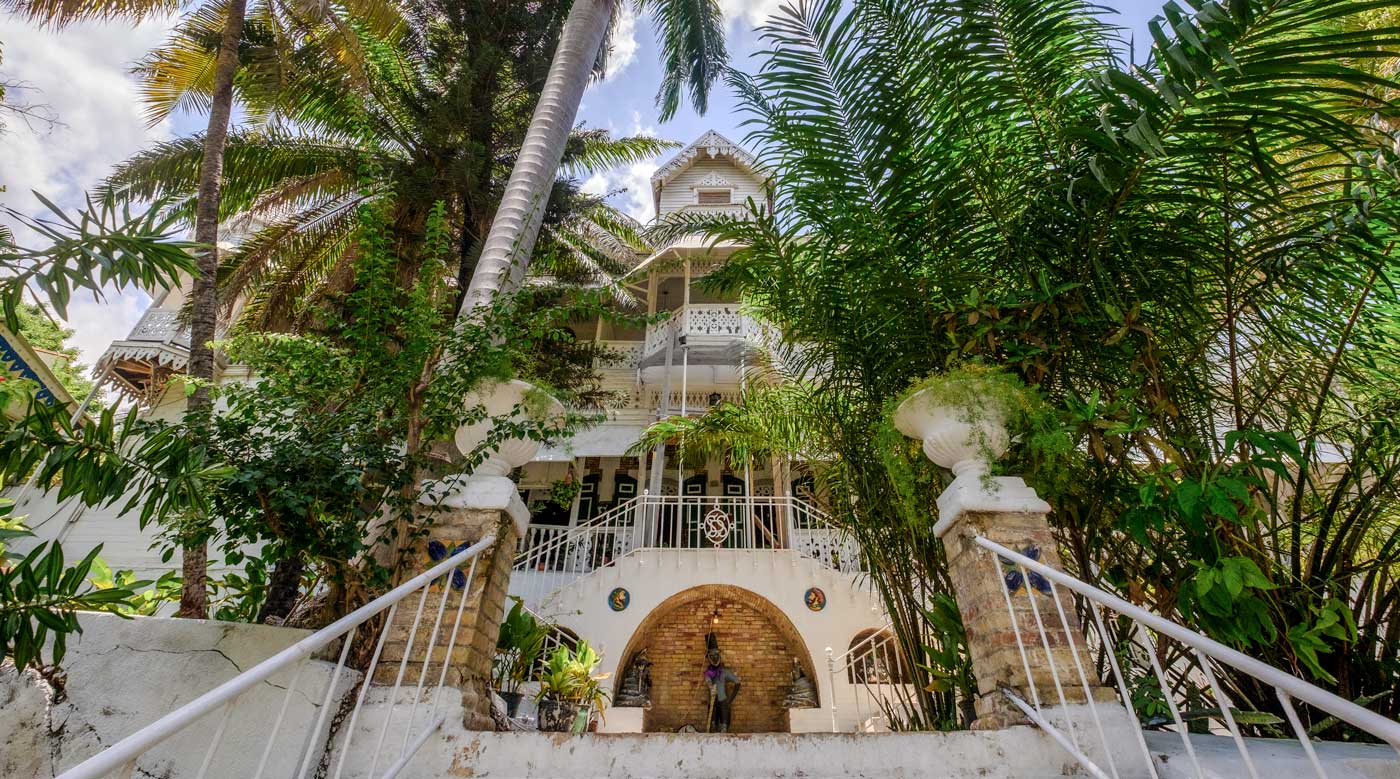
Photo: Jean Oscar Augustin
Visit the Oloffson Hotel
The iconic Hotel Oloffson, a gothic “Gingerbread” mansion surrounded by a lush tropical garden, has been described as the most iconic hotel of not just Haiti but the whole Caribbean. The rickety 19th-century mansion is amazingly intact given its location in the centre of a city that has seen so much destruction.
While I wait for the black iron gates to open, passersby weave around my car. I honk again, and the gates creak open just enough to let me through. A doorman in a black cap and a faded T-shirt nods at me, then promptly creaks the gate shut again.
A winding cobblestone path flanked by green foliage disappears into deep gardens. There’s no hotel in sight. Instead, wrought iron sculptures with diabolic faces peer out from between the leaves. More and more strange sculptures appear, some created from car parts in a style I recognize as belonging to the Atis Resistance movement.
As the driveway winds further uphill, the white lattice of the mansion roof appears over the palm trees and mango leaves. On the left side of the driveway, a glittering white-and-mirror mosaic wall emerges into view. In the center, the mural shows a red and blue boat. Trained eyes know that more than a simple sailboat, this is actually a dedication to the vodou spirit of the sea, Agwe. Near the anchor that dips into the white waves, sacred inscriptions hint at the magic and folklore that infuses Hotel Oloffson.
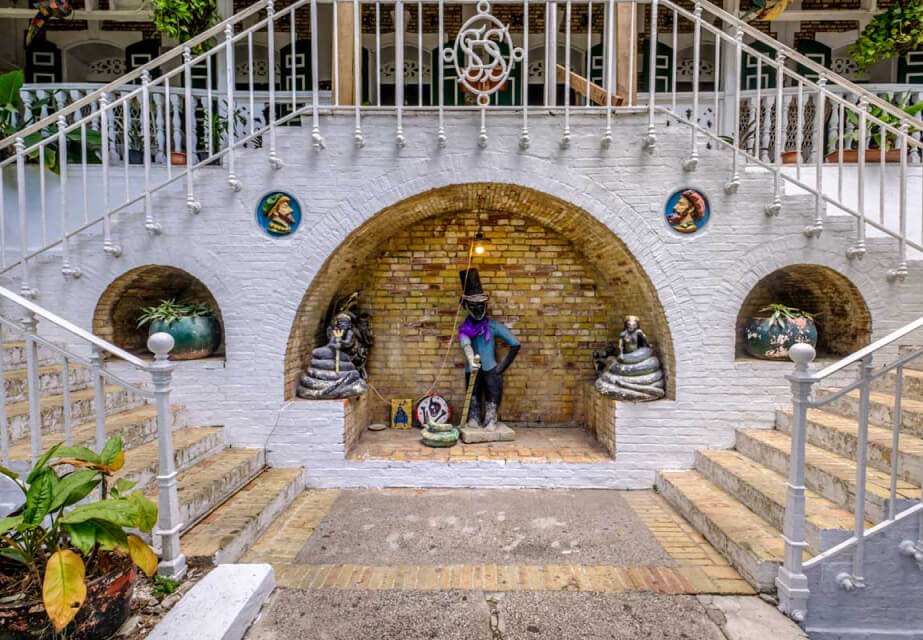
Photo: Jean Oscar Augustin
Parking on a cobblestone flatway, I turn off the motor, and approach the famous front entrance of the Hotel Oloffson. Craning to look up, I marvel at the nest-like widow’s peak and the many turreted balconies on the upper floors. This particular example of gingerbread architecture was described as “an illustration from a book of fairy tales” by American author Graham Greene who once lived and wrote here. A fan of Wes Anderson Movies, I imagine the Hotel Oloffson as a Caribbean cousin to The Grand Budapest Hotel.
An air of sleepiness and reverie envelops the front steps which veer off to the left and right. Everything is painted white – the bricks, the timber upper stories, the intricately carved wood panels that section off the balconies. In an alcove set into the white stone base of a staircase, several sculptures stand watch, including a three-foot-high man who represents the Gede family of vodou lwa. The Gede are the gods of the crossroads between life and death celebrated annually during the Haitian Day of the Dead.
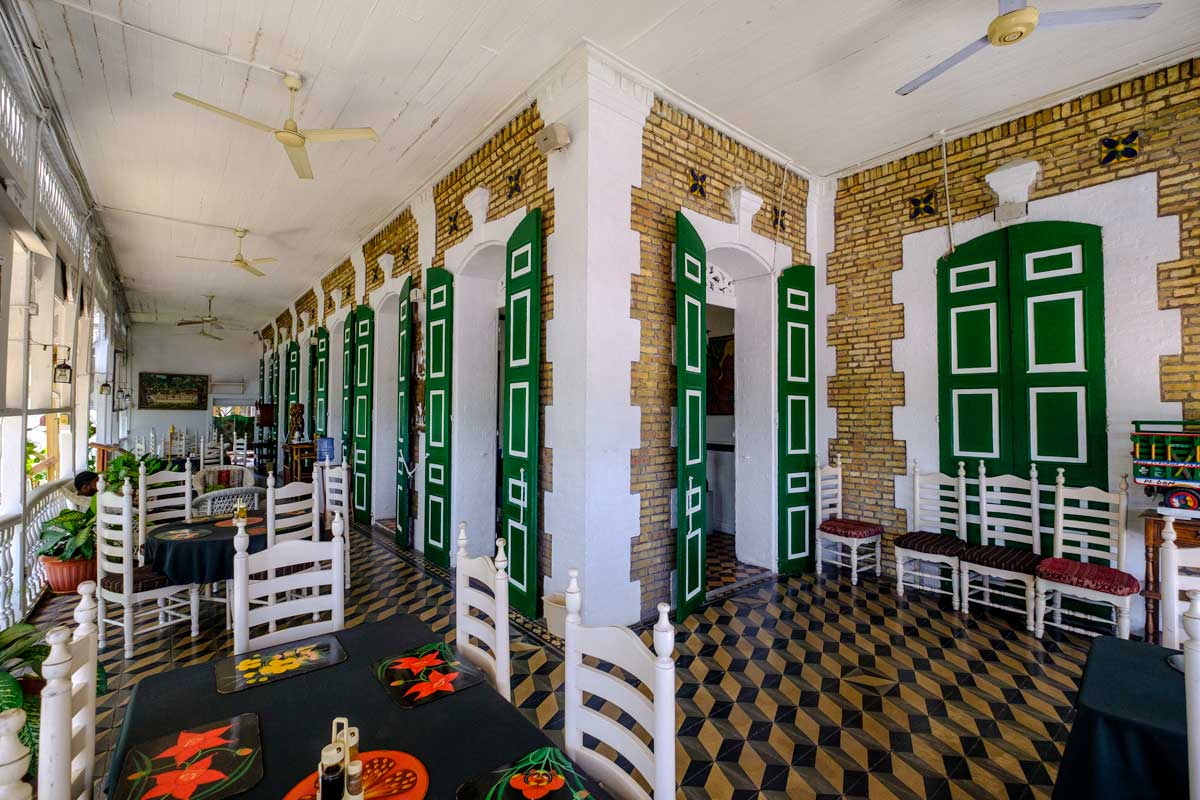
Photo: Jean Oscar Augustin
The Hotel Oloffson Restaurant
At the top of the stairs, an ancient-looking butler stands sentinel at the restaurant entrance. Behind him, an expansive verandah leads through a sequence of lobby rooms to a concert stage. I nod to the butler and choose a table in the far corner, overlooking the city of Port-au-Prince and the strip of azure sea beyond. A century of politicians, musicians, local artists and vodou priests have sat in this same chair.
The butler takes my order – the Oloffson’s famous rum punch cocktail and a side of accra – and shuffles over nineteenth-century mosaic tiles to disappear behind saloon doors painted with a vivid Haitian countryside scene. Haitian art is smattered across the grounds. The corner table of the Oloffson verandah is an excellent vantage point to take in the art collection that begins in the sculpture garden below and creeps up to the mansion, covering nearly every wall of the hotel lobby, restaurant, and its myriad guest rooms.
Above the table, a pearly pink-and-white sequined flag catches my eye. It carries one of the lwa cosmograms- sacred designs that act like a beacon, calling down the corresponding spirit. The curving heart shape indicates this is a flag created for Erzulie Freda – spirit of love and protector of children.
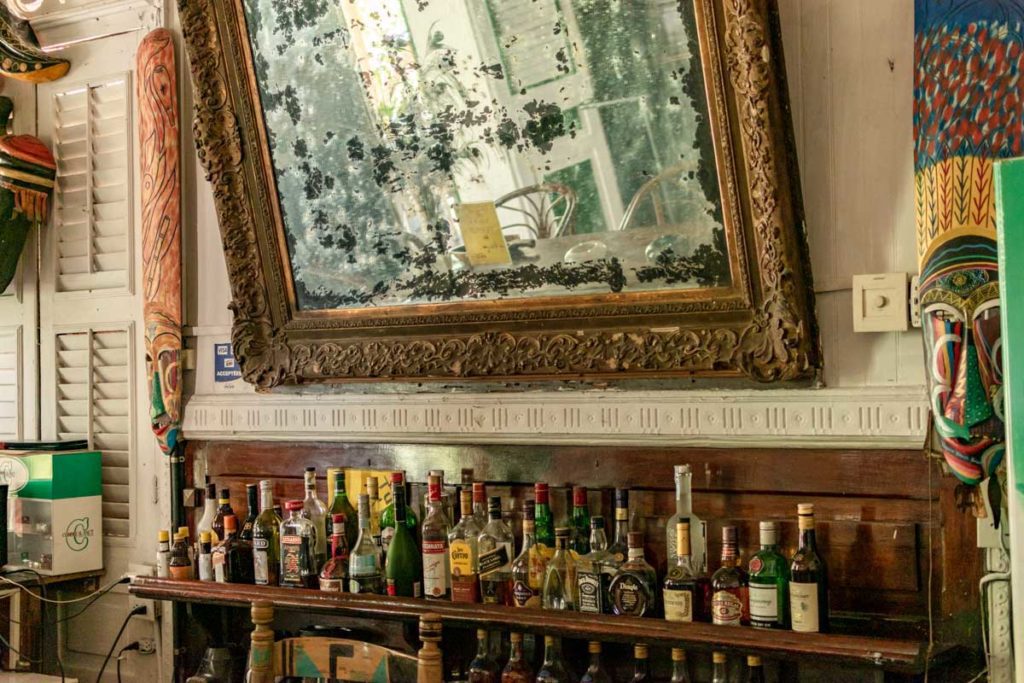
Photo: Jean Oscar Augustin
What to order
For starters, try the Oloffson’s famous rum punch cocktail, or a rum sour if you’re after something simpler. The best accompaniment is accra: the deep-fried, very spicy batter made from malanga root is prepared with special care in the hotel kitchen below, and arrives with a heaping pile of spiced pikliz – best eaten with your fingers.
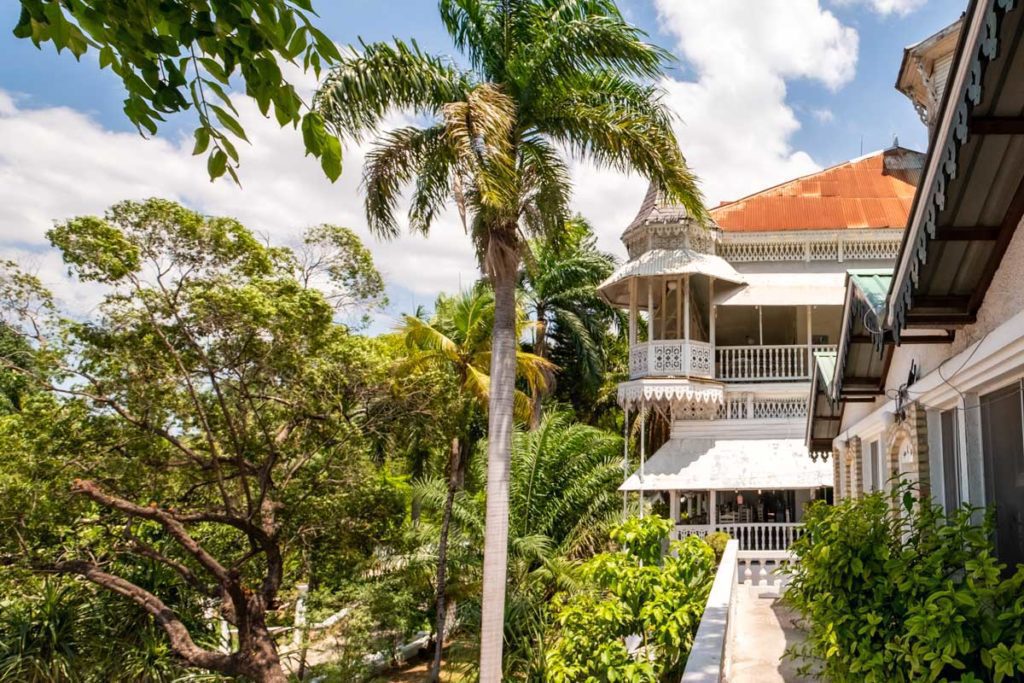
Photo: Jean Oscar Augustin
History
The mansion was built as the primary residence for the Sam family, an influential clan that boasts two former presidents of Haiti among its ranks. In 1915, following the infamous death of its owner at the hands of political protestors, the Sam mansion was seized by US military forces. The mansion served as a US military hospital until the US occupation ended in 1934.
Few visitors to Haiti know how the famed Hotel Oloffson got its current name, but I’ll let you in on the secret. In 1935, when the US occupation ended, the mansion was leased to a Swedish sea captain named Werner Gustav Oloffson, who wanted to retire from life on the open water in Haiti’s summery climate. Along with his wife Margot and two children, Captain Oloffson set about converting the lush expansive gardens, gingerbread mansion and hospital wing into Haiti’s finest hotel.
In the 1950s, 60s and 70s, the hotel went Hollywood. An outpost for the rich and fabulous, the Oloffson hosted the American political and cultural elite – Jackie Onassis Kennedy would often be found fanning herself on the nest-like balcony of the grand honeymoon suite. The emerald-green swimming pool in the garden hosted an endless stream of parties for musicians, models and writers, as one expat owner after the other took their turn at the helm.
Many of the rooms now boast hand-painted placards with the name of a famous past guest. Visitors can sleep in the Mick Jagger room, Jackie O room, Graham Greene room and more. Like their erstwhile guests, the hotel corridors are anything but straight and narrow: some suites are situated above the swimming pool, connected by hidden corridors. Others you reach by a winding narrow staircase off the main lobby. The staircase to the second floor is an ancient wooden construction that sinks underfoot in places, and leads further up into lofty galleries, then through a wooden passageway. Still more wooden passages take visitors into the wing that once held the American military hospital. The most sought-after rooms are in the main mansion, just above the lobby.
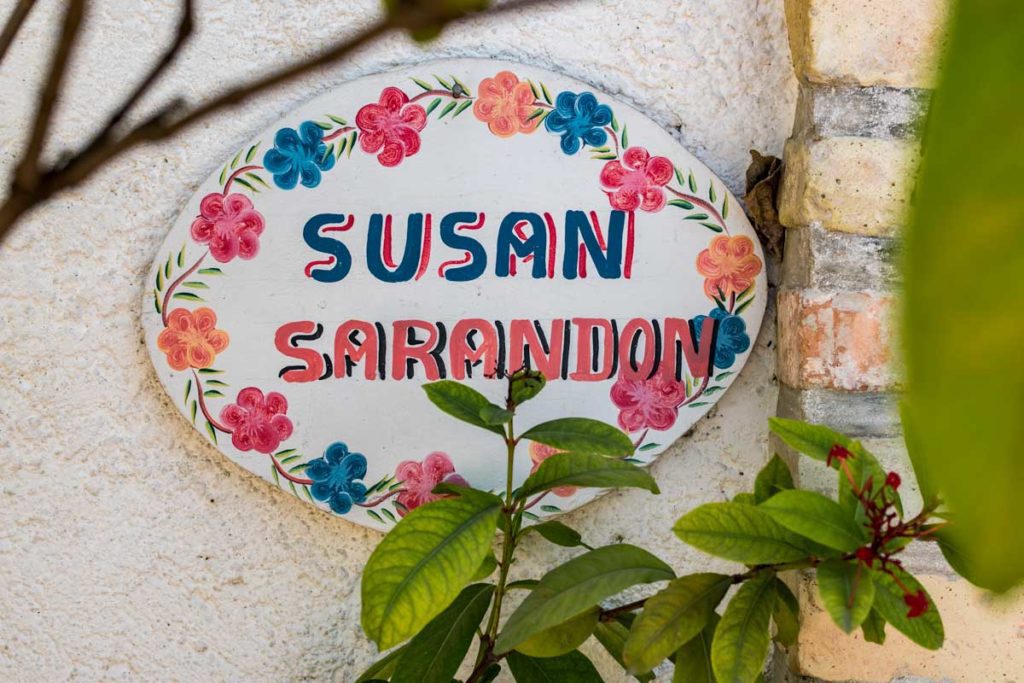
Photo: Jean Oscar Augustin
Live Music
Every Saturday night at the Oloffson, the band RAM – an absolute national treasure – delivers an unforgettable performance of vodou-infused rock. If you’re not a guest at the hotel or paying for a sit-down dinner, you’ll need to pay an entry fee of 500 HTG (about 5 U.S. dollars). The show starts around 10:30. Expect sing-a-longs with an enthusiastic crowd and dancing all night long. (Note that until recently, RAM played every Thursday, but changed to Saturdays in 2020.)
Weekly performances by RAM have become a ceremonial-grade ritual loved by all levels of society. Remarkably, in a country where consistency is hard to find, the band has consistently gigged at the Oloffson since 1990, when the band’s frontman took over running the hotel.
A “vodou rock and roots” band, RAM incorporates traditional vodou lyrics and instruments, such as rara horns and Petwo drums, into rock, and their lyrics are sung in a macaronic medley of Haitian creole, French and English.
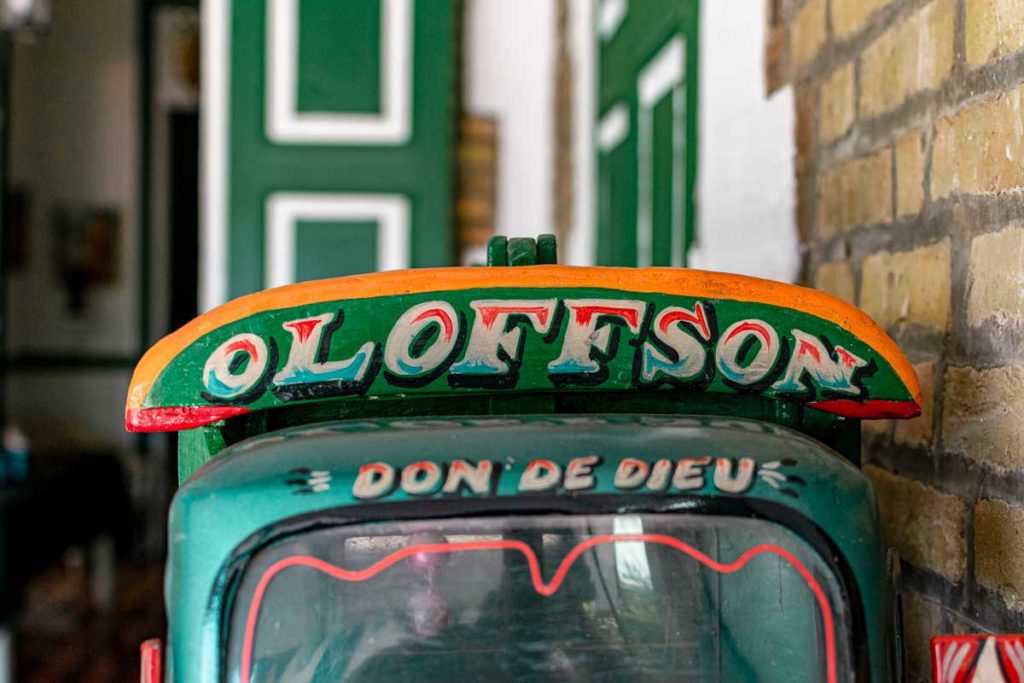
Photo: Jean Oscar Augustin
The 2010 earthquake
After the 2010 earthquake, the Oloffson was one of the few hotels left standing in Port-au-Prince. Some joked that the ancient structure was held together by termites in the wood and magic in the rafters, but research has since shown that Haiti’s traditional gingerbread houses are surprisingly earthquake resistant.
The Oloffson became a major hub for the influx of humanitarian workers and global media outlets that descended on the capital. The expansive porches and grounds were an informal HQ for foreigners and emissaries of the estimated hundred thousand charities who became active in the “NGO Republic” of Port-au-Prince. Anyone seeking a meeting or rendezvous point defaulted to the Oloffson.
Era after era, the space has served its guests loyally. The Oloffson has been a family home, hotel, hospital, jam-hall, meeting place, humanitarian headquarters, art gallery, and celebrity escape.
The Hotel Oloffson stands guard over downtown Port-au-Prince, undeterred by rebellion, earthquake, or the famous faces that wander its corridors. The beauty of the fairytale is still unraveling, and seated comfortably in my chair with this view, I feel grateful for yet another chance to weave my own story into the stories of those who have come before. Sipping my rum punch, I wonder what will become of this space in another fifty years. Who will drive up the garden passage, and what incarnation of the Oloffson will they find?
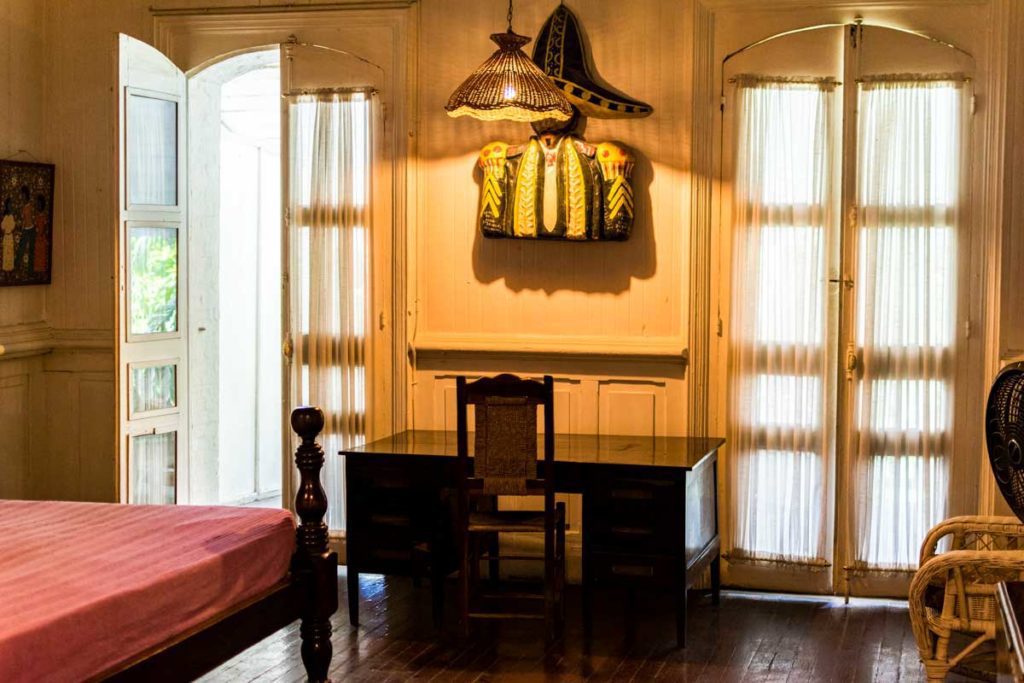
Photo: Jean Oscar Augustin
Stay at the Oloffson
Almost a century after Captain Oloffson took over the sprawling gingerbread mansion, the Oloffson is still running as a boutique hotel.
Guests can stay in one of 22 rooms, dine at the in-house restaurant and lounge at the outdoor pool. All suites include a free continental breakfast, free WiFi, and free parking. One of the Oloffson’s attractions is its seclusion, and to save you having to travel into the city for essentials, there’s even a convenience store on site.
RAM plays on Saturday nights. The show is free for hotel guests and dinner customers.
The Oloffson is hidden from view on 60 Ave Christophe, Port-au-Prince, in the neighbourhood of Saint Gérard, just near trendy Pacot.
Within a short walk you’ll find the Museum of Haitian Art, Champs de Mars Square and the National Pantheon Museum. Haiti’s main airport is a 10 minute drive away.
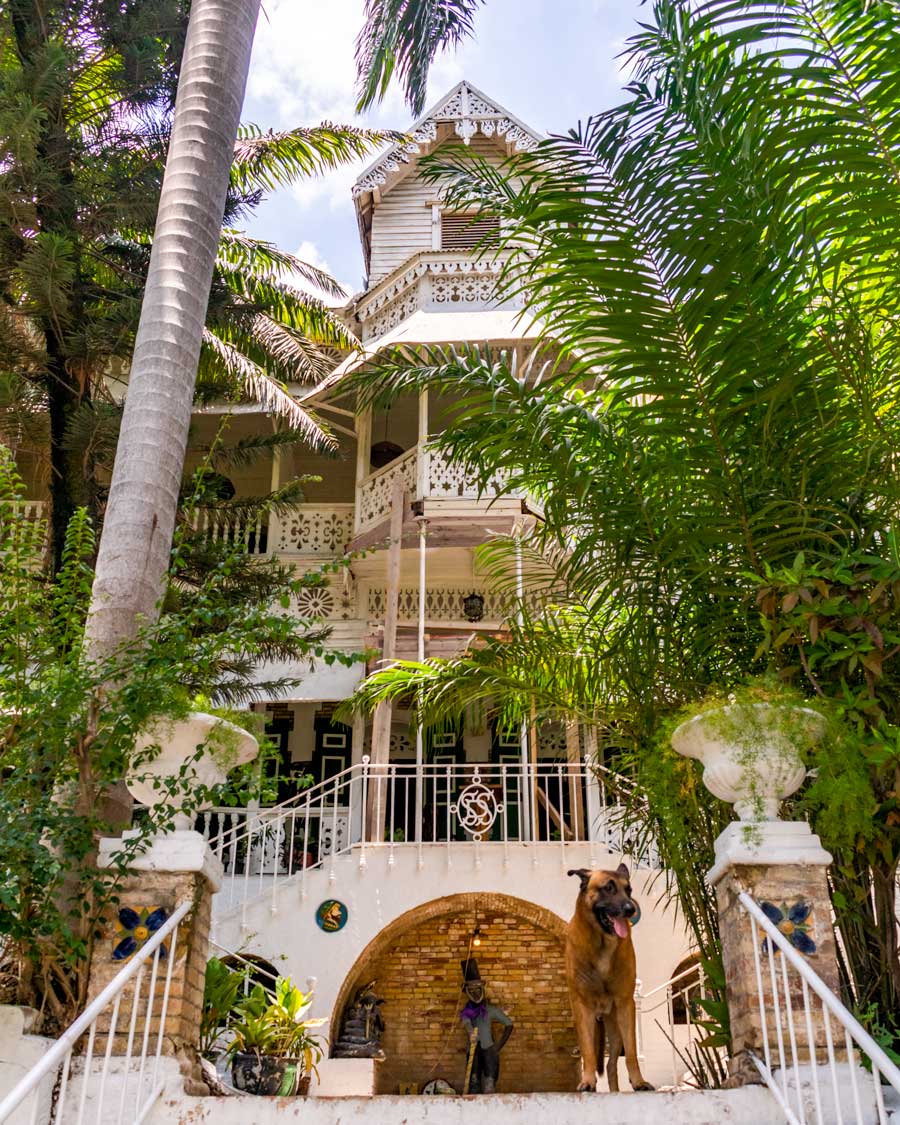
Photo: Jean Oscar Augustin
Written by Emily Bauman.
Published October 2020.
Find Hotel Oloffson
EXTERNAL LINKS
Book your stay at Hotel Oloffson on Hotels.com

Explore Haiti’s History & Heritage
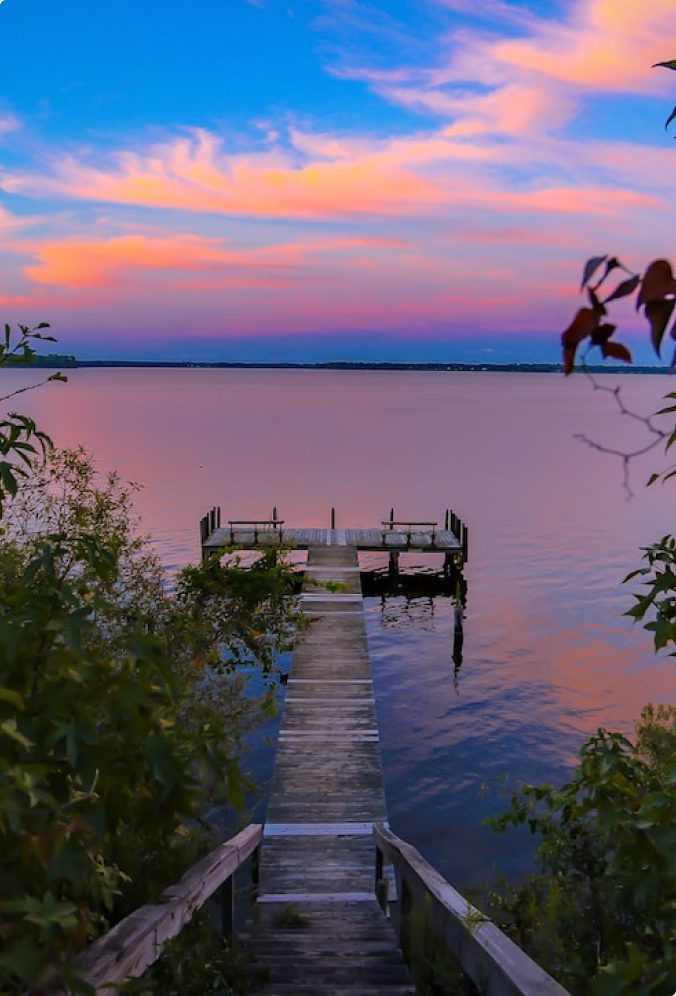
Paradise for your inbox
Your monthly ticket to Haiti awaits! Get first-hand travel tips, the latest news, and inspiring stories delivered straight to your inbox—no spam, just paradise.



